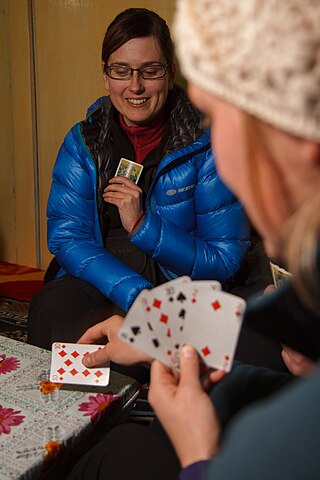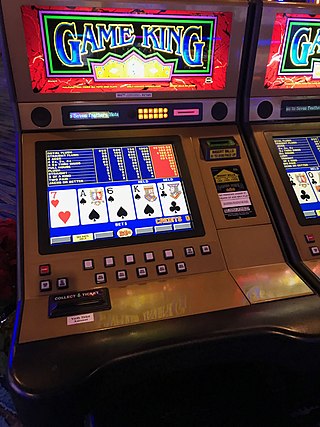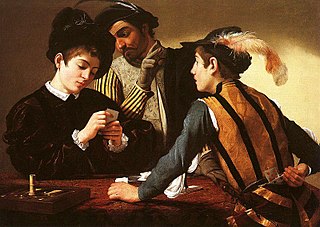
Blackjack is a casino banking game. It is the most widely played casino banking game in the world. It uses decks of 52 cards and descends from a global family of casino banking games known as Twenty-One. This family of card games also includes the European games Vingt-et-Un and Pontoon, and the Russian game Ochko. Blackjack players do not compete against each other. The game is a comparing card game where each player competes against the dealer.

Poker is a family of comparing card games in which players wager over which hand is best according to that specific game's rules. It is played worldwide, but in some places the rules may vary. While the earliest known form of the game was played with just 20 cards, today it is usually played with a standard deck, although in countries where short packs are common, it may be played with 32, 40 or 48 cards. Thus poker games vary in deck configuration, the number of cards in play, the number dealt face up or face down, and the number shared by all players, but all have rules that involve one or more rounds of betting.

Yablon, also known as red dog, is a game of chance played with cards, in which two cards are dealt and a player bets on whether the rank of a third card would fall between them. While found in some land casinos, its popularity has declined, although it is featured at many online casinos.

War is a simple card game, typically played by two players using a standard playing card deck — and often played by children. There are many variations, as well as related games such as the German 32-card Tod und Leben.
Fixed-odds betting is a form of wagering against odds offered by a bookmaker or an individual or on a bet exchange. It involves betting on an event in which there is no fluctuation on the payout. In Australia, the practice is usually known as "SP betting".

President is a shedding card game for three or more, in which the players race to get rid of all of the cards in their hands in order to become "president" in the following round. It is a Westernized version of Chinese climbing card games such as Zheng Shangyou, and the Japanese Daifugō.

Euchre or eucre is a trick-taking card game commonly played in Australia, Canada, Great Britain, New Zealand and the Midwestern United States. It is played with a deck of 24, 28, or 32 standard playing cards. Normally there are four players, two on each team, although there are variations for two to nine players.

Video poker is a casino game based on five-card draw poker. It is played on a computerized console similar in size to a slot machine.
Razz is a form of stud poker that is normally played for ace-to-five low. It is one of the oldest forms of poker, and has been played since the start of the 20th century. It emerged around the time people started using the 52-card deck instead of 20 for poker.
Spanish 21 is a blackjack variant owned by Masque Publishing Inc., a gaming publishing company based in Colorado. Unlicensed, but equivalent, versions may be called Spanish blackjack. In Australia and Malaysia, an unlicensed version of the game, with no dealer hole card and significant rule differences, is played in casinos under the name "Pontoon". It was first introduced about 1995.

Briscola is one of Italy's most popular games, together with Scopa and Tressette. A little-changed descendant of Brusquembille, the ancestor of Briscan and Bezique, Briscola is a Mediterranean trick-taking, Ace-Ten card game for two to six players played with a standard Italian 40-card deck. The game can also be played with a modern Anglo-French deck, without the eight, nine and ten cards. With three or six players, twos are removed from the deck to ensure the number of cards in the deck is a multiple of the number of players; a single two for three players and all four twos for six players. The four- and six-player versions of the game are played as a partnership game of two teams, with players seated such that every player is adjacent to two opponents.

Rummoli is a family card game for 2 to 8 people. This Canadian board game, first marketed in 1940 by the Copp Clark Publishing Company of Toronto requires a Rummoli board, a deck of playing cards, and chips or coins to play. The game is usually played for fun, or for small stakes. Rummoli is one of the more popular versions of the Stops Group of matching card games, in particular it falls into a subgroup of stops games based on the German Poch and falls into a family of Poch variants such as the French Nain Jaune, the Victorian Pope Joan but most like the American game Tripoley which debuted eight years earlier in Chicago in 1932.

Nerts (US), or Racing Demon (UK) is a fast-paced multiplayer card game involving multiple decks of playing cards. It is often described as a competitive form of Patience or Solitaire. In the game, players or teams race to get rid of the cards in their "Nerts pile" by playing them in sequences from aces upwards, either into their personal area or in a communal central area. Each player or team uses their own deck of playing cards throughout the game.

Super Fun 21 is a variation of blackjack. The game is played using a standard 52 card deck. Aces can be counted as either a one or eleven depending on which value would best benefit the player's hand. All the face cards in the deck each count as ten. The remaining cards are taken at face value. The player must first place a bet and is then dealt two cards face up. The dealer is dealt two cards as well, but one is face up and one face down. The player then has the option to either "hit", or "stand". The player's hand must beat the dealer's by coming closer to 21 without "busting". A winning hand with a total of 21 is called a blackjack, or natural.

Malaysian Pontoon is a card game related to Pontoon and blackjack and, like those games, a descendant of Vingt-Un or Twenty-One. It is played by those in Australia, Malaysia and Singapore, where it is usually just called pontoon. This game is similar to match play 21 or Spanish 21, while original pontoon, played in Britain, holds closer to the traditional Twenty-One rules, but can be quickly distinguished by the use of the terms "twist" and "stick".
Indian Cherokee Rummy is a card game in India with little variation from original rummy. It may be considered a cross between Rummy 500 and gin rummy. Indian Rummy is a variant of the rummy game popular in India that involves making valid sets out of 13 cards that are distributed among every player on the table. Each player is dealt 13 cards initially; if the number of players is 2, then a 52 cards deck is chosen for the game and if there are 6 players, two decks of 52 cards each is combined for the game. Each player has to draw and discard cards by turns till one player melds their cards with valid sets that meet the Rummy validation rules. It could be that Indian Rummy evolved from a version of Rummy in South Asia, Celebes Rummy, also called Rhuk.
The following is a glossary of poker terms used in the card game of poker. It supplements the glossary of card game terms. Besides the terms listed here, there are thousands of common and uncommon poker slang terms. This is not intended to be a formal dictionary; precise usage details and multiple closely related senses are omitted here in favor of concise treatment of the basics.
Stud poker is any of a number of poker variants in which each player receives a mix of face-down and face-up cards dealt in multiple betting rounds. Stud games are also typically non-positional games, meaning that the player who bets first on each round may change from round to round. The cards dealt face down to each individual player are called hole cards, which gave rise to the common English expression ace in the hole for any hidden advantage.

Australian Patience is a patience or card solitaire using one deck of playing cards. This game is a challenging combination of Klondike and Scorpion, and is also closely related to Yukon. The object of the game is to move all of the cards to the Foundations.

Polish Bank, Polski Pachuck, Grundehrlich, Polish Red Dog or Stitch, is a gambling game using playing cards which resembles Häufeln and Mauscheln. The game is recorded as early as 1836 in the Austro-Hungarian Empire where it was banned on the grounds of being purely a game of chance or hazard.















